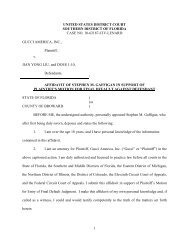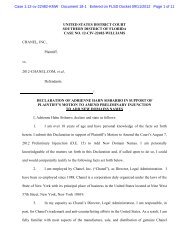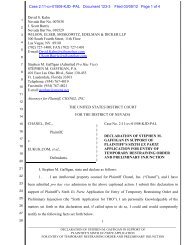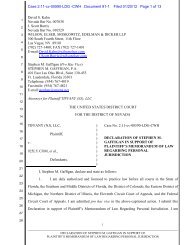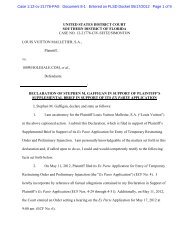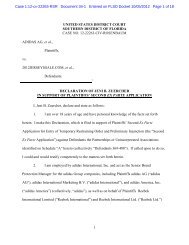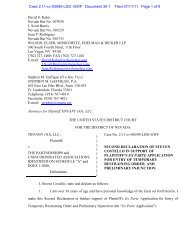UNITED STATES DISTRICT COURT SOUTHERN DISTRICT OF ...
UNITED STATES DISTRICT COURT SOUTHERN DISTRICT OF ...
UNITED STATES DISTRICT COURT SOUTHERN DISTRICT OF ...
Create successful ePaper yourself
Turn your PDF publications into a flip-book with our unique Google optimized e-Paper software.
Case 0:10-cv-61942-MGC Document 5-6 Entered on FLSD Docket 10/14/2010 Page 58 of 75<br />
Article 167. With respect to a citizen whose whereabouts have been unknown for four years or whose whereabouts have been unknown for<br />
two years after an accident in which he was involved, or whose whereabouts have been unknown after an accident in which he was<br />
involved and, upon verification by the relevant authorities, the said citizen is unable to survive, if the interested party applies for proclaiming<br />
such person as dead, the application shall be filed with the basic people's court in the locality where the missing person has his domicile.<br />
The application shall clearly state the facts and time of the disappearance as well as the action requested, and documentary evidence from<br />
a public security organ or other relevant organs concerning the disappearance of this citizen shall be appended.<br />
Article 168. After accepting a case concerning a proclamation of a person as missing or dead, the people's court shall issue a public search<br />
notice for the person whose whereabouts have been unknown. The time limit of the notice on the proclamation of a person as missing shall<br />
be three months, and the time limit of the notice on the proclamation of a person as dead shall be one year. Where a citizen's whereabouts<br />
have been unknown after an accident in which he was involved and, upon verification by the relevant authorities, the said citizen is unable<br />
to survive, he time limit of the notice on the proclamation of such person as dead shall be three months.<br />
On the expiration of the time limit of the public notice, the people's court shall, depending on whether the facts about the missing or death of<br />
the person have been confirmed, make a judgment proclaiming the person as missing or dead or make a judgment to reject he application.<br />
Article 169. Should a person who has been proclaimed as missing or dead by a people's court reappear, the people's court shall, upon the<br />
application of that person or an interested party, make a new judgment and annul the previous one.<br />
SECTION 4 CASES CONCERNING THE DETERMINATION <strong>OF</strong> A CITIZEN AS INCOMPETENT OR WITH LIMITED CAPACITY FOR<br />
CIVIL CONDUCT<br />
Article 170. An application for determining a citizen as incompetent or with limited capacity for civil conduct shall be filed by the citizen's<br />
near relatives or any other interested party with the basic people's court in the locality where the citizen has his domicile.<br />
The application shall clearly state the facts and grounds on which the citizen's incompetence or limited capacity for civil conduct is claimed.<br />
Article 171. After accepting such an application, the people's court shall, when necessary, have an expert evaluation on the citizen whose<br />
incompetence or limited capacity for civil conduct is claimed; if the applicant has already provided an evaluation conclusion, the people's<br />
court shall examine the conclusion.<br />
Article 172. When the people's court handles a case for determining a citizen as incompetent or with limited capacity for civil conduct, a near<br />
relative of the citizen shall be the agent ad litem, however, except the applicant. If the near relatives shift the responsibility onto one another,<br />
the people's court shall appoint one of them as an agent ad litem for the citizen. If the citizen's state of health permits, the people's court<br />
shall also question the citizen.<br />
If the people's court is convinced, after trial, that the application is based on facts, it shall make a judgment determining he citizen as<br />
incompetent or with limited capacity for civil conduct; if the court finds that the application is not based on facts, it shall make a judgment to<br />
reject it.<br />
Article 173. If, upon the application of a person who has been determined as incompetent or with limited capacity for civil conduct or of his<br />
guardian, the people's court verifies that the causes of that person's incompetence or limited capacity for civil conduct has been eliminated,<br />
it shall make a new judgment and annul the previous one.<br />
SECTION 5 CASES CONCERNING THE DETERMINATION <strong>OF</strong> A PROPERTY AS OWNERLESS<br />
Article 174. An application for determining a property as ownerless shall be filed by a citizen, legal person or any other organization with the<br />
basic people's court in the place where the property is located.<br />
The application shall clearly state the type and quantity of he property and the grounds on which the application for determining the<br />
property as ownerless is filed.<br />
Article 175. The people's court shall, after accepting such an application and upon examination and verification, issue a public notice for the<br />
claim of the property. If no one claims the property within one year from the issue of the public notice, the people's court shall make a<br />
judgment determining the property as ownerless and turn it over to the state or the collective concerned.<br />
Article 176. If, after a property has been determined by a judgment as ownerless, the owner of the property or his heir appears and claims<br />
the property, the people's court shall, after examination and verification, make a new judgment and annul the previous one.<br />
CHAPTER XVI PROCEDURE FOR TRIAL SUPERVISION<br />
<br />
Article 177. If the president of a people's court at any level finds some definite error in a legally effective judgment or order of his court and<br />
deems it necessary to have the case retried, he shall refer it to the judicial committee for discussion and decision.<br />
If the Supreme People's Court finds some definite error in a legally effective judgment or order of a local people's court at any level, or if a<br />
people's court at a higher level finds some definite error in a legally effective judgment or order of a people's court at a lower level, it shall<br />
have the power to bring the case up for trial itself or direct the people's court at a lower level to conduct a retrial.<br />
Article 178. If a party considers that a legally effective judgment or order has some error, he may apply to the people's court which originally<br />
tried the case or to a people's court at the next higher level for retrial; however, execution of the judgment or order shall not be suspended.<br />
Article 179. If an application made by a party involves any of the following circumstances, the people's court shall retry the case:<br />
(1) the new evidence is conclusive enough to repudiate the original judgment or order;



